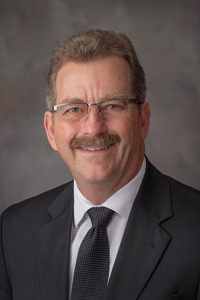Rural-based broadband funding plan clears first round
Lawmakers advanced a bill March 31 meant to give rural customers more input on their broadband carriers.

The Public Service Commission adopted rules in 2018 to withhold Nebraska Universal Service Fund support from telecommunications carriers that do not offer broadband services and instead redirect that funding to eligible carriers who could provide broadband in the same exchange area.
Currently, those funds could be redirected only through a reverse auction process. LB338, sponsored by Brainard Sen. Bruce Bostelman, would authorize a second method to redirect funds known as a rural-based plan.
Providers have been awarded funding in the past, Bostelman said, but failed to meet minimum standards for broadband service.
“This [bill] simply allows the PSC to consider a rural-based plan that has been created with the input of local businesses, hospitals, schools, residents and agricultural producers, in and outside city or village limits, on which [provider] they think will best serve their needs,” he said.
To qualify for consideration by the PSC, a rural-based plan must include an eligible telecommunications company. The plan would be judged on the company’s history and service capability in the area, as well as local support, partnerships with local public power and wireless internet service providers and cooperation by the incumbent local exchange carrier that has lost support from the commission.
A plan approved under the provisions of LB338 by the PSC would include a deployment timeline to include periodic milestones and reporting requirements from the telecommunications company.
Bostelman introduced an amendment that would require any recipient of ongoing high-cost financial support from the universal service fund to submit to broadband service speed tests by the PSC.
Any universal service funds distributed for new broadband infrastructure construction would be directed to projects that provide service scalable to 100 Mbps or greater of upload speed.
Additionally, the amendment would require that any political subdivision that receives federal funding for broadband service enhancement provide service scalable to 100 Mbps or greater for both upload and download speed.
Bostelman called the amendment a compromise and the result of negotiations among the interested stakeholders.
“This [amendment] will protect existing high-quality infrastructure from subsidized overbuild [and] enhances competition in areas that have slower service,” he said.
Seward Sen. Mark Kolterman supported the amendment, saying it aligns with goals the governor has set for broadband service across the state.
“If we’re going to build out our state and grow our state, we’ve got to have very good broadband,” he said.
Also supporting the amendment was Sen. Curt Friesen of Henderson. He said the speed standards proposed in the amendment are necessary to ensure that everyone in the state has access to high-speed broadband, but cautioned that it would create some resistance from broadband service providers.
The Bostelman amendment was adopted on a 38-1 vote.
Omaha Sen. Justin Wayne offered an amendment that would incorporate provisions of his LB656, allowing municipalities to provide broadband service. He compared the movement to treat broadband as a public utility with Nebraska’s adoption of a public power system.
“Every argument we have for why this should stay in private hands are the exact same arguments this [legislature] struggled with from the 1800s to 1970,” he said.
Wayne withdrew the amendment, saying he did not want to derail the compromise achieved on the underlying bill.
Following the 40-0 adoption of a technical committee amendment, senators voted 42-0 to advance LB338 to select file.


